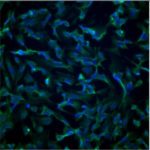Lien DOI – 10.1128/mBio.02558-21
mBio. 2021 Nov-Dec; 12(6): e02558-21
Malaria parasites need to cope with changing environmental conditions that require strong countermeasures to ensure pathogen survival in the human and mosquito hosts. The molecular mechanisms that protect Plasmodium falciparum homeostasis during the complex life cycle remain unknown. Here, we identify cytosine methylation of tRNAAsp (GTC) as being critical to maintain stable protein synthesis. Using conditional knockout (KO) of a member of the DNA methyltransferase family, called Pf-DNMT2, RNA bisulfite sequencing demonstrated the selective cytosine methylation of this enzyme of tRNAAsp (GTC) at position C38. Although no growth defect on parasite proliferation was observed, Pf-DNMT2KO parasites showed a selective downregulation of proteins with a GAC codon bias. This resulted in a significant shift in parasite metabolism, priming KO parasites for being more sensitive to various types of stress. Importantly, nutritional stress made tRNAAsp (GTC) sensitive to cleavage by an unknown nuclease and increased gametocyte production (>6-fold). Our study uncovers an epitranscriptomic mechanism that safeguards protein translation and homeostasis of sexual commitment in malaria parasites. IMPORTANCE P. falciparum is the most virulent malaria parasite species, accounting for the majority of the disease mortality and morbidity. Understanding how this pathogen is able to adapt to different cellular and environmental stressors during its complex life cycle is crucial in order to develop new strategies to tackle the disease. In this study, we identified the writer of a specific tRNA cytosine methylation site as a new layer of epitranscriptomic regulation in malaria parasites that regulates the translation of a subset of parasite proteins (>400) involved in different metabolic pathways. Our findings give insight into a novel molecular mechanism that regulates P. falciparum response to drug treatment and sexual commitment.









